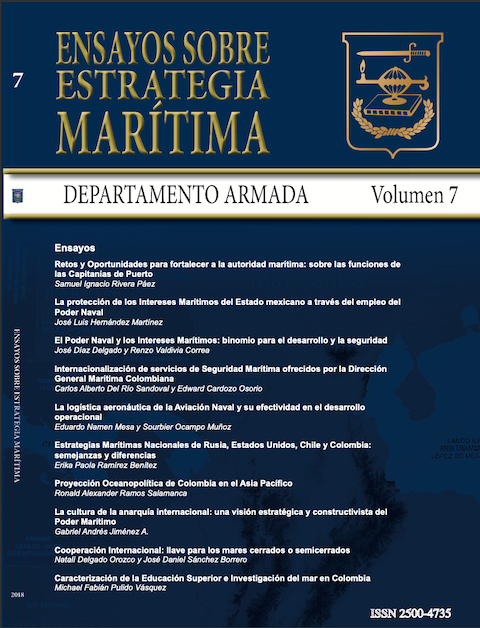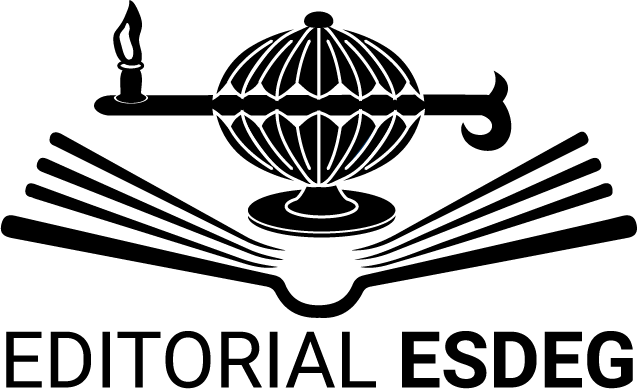La cultura de la anarquía internacional: una visión estratégica y constructivista del Poder Marítimo
DOI:
https://doi.org/10.25062/2500-4735.475Keywords:
hobbesian culture, lockian culture, anarchic culture, neorealism, neoclassical realismAbstract
The culture, the behavior, the Maritime Interests and the identity derived from the Naval Power are variables that the traditional Theories do not develop at the time of seeing changes in the anarchic system. Conceiving anarchy as an independent and unchangeable variable is an error, since critical theories such as constructivism allow us to analyze how these variables modify the anarchic reality of the System since, “Anarchy is what the States make of it”. So the behavior that States take will directly affect identities and interests, therefore, the reconstruction of interest occurs when interacting with a new agent. An example of this is evidencing the role of China’s external agent with the countries of South Asia and Southeast Asia, where interference in commercial, financial and technological matters turns into a change in the interests and identities of the States and even greater, when aid in cooperation is based on alliances rooted in the promotion of Maritime and Naval Power, which States see with greater possibility, due to their degree of cooperation (Lockian culture) and not through the imposition of national interests represented hard power as evidenced by the Hobbesian culture implanted by the United States in the Middle East.Author Biography
Gabriel Andrés Jiménez A, Universidad del Rosario, Colombia
References
Alterman, John. “China’s Balancing Act in the Gulf”. En Middle East program, Center for strategic and international studies, Agosto 2013. Documento disponible: http://csis.org/files/publication/130821_Alterman_ChinaGulf_Web.pdf.
Cordesman, Anthony. “Judging a P5+1 Nuclear Agreement with Iran: The Key Criteria”. En Center for strategic and international studies, marzo de 2015. Documento disponible: http://csis.org/publication/judging-p51-nuclear-agreement-iran-key-criteria.
Dorraj, Manochehr; English James. “China’s Strategy for Energy Acquisition in the Middle East: Potential for Conflict and Cooperation With the United States.”. Asian politics and policy, Vol.4, No2, pp. 173-191. Documento disponible en: https://doi.org/10.1111/j.1943-0787.2012.01335.x.
Goldemberg, Ilan; Ratner Ely. “China’s Middle East Tightrope”. Foreign Policy Magazine, 20 de abril de 2015. Documento disponible: http://foreignpolicy.com/2015/04/20/china-middle-east-saudi-arabia-iran-oil-nuclear-.
Comparar Kennedy, Scott. “Building China’s “One Belt, One Road””. Center for strategic and international studies, 03 de abril de 2015. Documento disponible: http://csis.org/publication/building-chinas-one-belt-one-road.
Marsh, Kevin. “Managing Relative Decline: A Neoclassical Analysis of the 2012 US Defense Strategy Guidance”, In Contemporary Security Policy, Vol 33 Issue 3, 2012. Documento Disponible en: https://doi.org/10.1080/13523260.2012.727681
Rothkopf, David. “The Middle East’s pivot to Asia”. En Foreign Policy Magazine, 24 de abril de 2015. Documento disponible en: http://foreignpolicy.com/2015/04/24/the-middle-easts-pivot-to-asia-china/.
Sager, Abdulaziz. “GCC-China Relations: Looking Beyond Oil-Risk and Rewards”. En China’s Growing Role In the Middle East: Implications for the Region and Beyond, The Nixon center, 2010, Pág. 5. Documento disponible: http://www.cftni.org/full-monograph-chinas-growing-role-in-me.pdf.
Yuan, Luo. “China’s Strategic Interests in the Gulf and Trilateral Relations among China, the U.S. and Arab Countries”. En China’s Growing Role In the Middle East: Implications for the Region and Beyond, The Nixon center, 2010, Pág. 23. Documento disponible: http://www.cftni.org/full-monograph-chinas-growing-role-in-me.pdf.
Wendt, Alexander “Anarchy is what States Make of it: The Social Cons- truction of Power Politics”, en International Organization, vol. 46, No. 2 (Primavera 1992), pp. 391-425. Documento disponible en : http://eds.a.ebscohost.com.ez.urosario.edu.co/eds/detail/detail?vid=2&si-d=7427297f-02cd-4905-b551-d69b5801dc8d%40sessionmgr4001&hi-d=4202&bdata=Jmxhbmc9ZXMmc2l0ZT1lZHMtbGl2ZQ%3d%3d#d-b=edsjsr&AN=edsjsr.2706858.
How to Cite
Downloads
Downloads
Published
Issue
Section
License
Copyright (c) 2022 Ensayos sobre Estrategia Marítima

This work is licensed under a Creative Commons Attribution-NonCommercial-NoDerivatives 4.0 International License.

| Article metrics | |
|---|---|
| Abstract views | |
| Galley vies | |
| PDF Views | |
| HTML views | |
| Other views | |
















